
Seeing is no longer believing: AI's double role in India's battlefield and ballot box | India News - Times of India
作者:Bhagya Luxmi Yadav / TIMESOFINDIA.COM / Updated: Jun 06, 2025, 20:09 IST

This is a representative AI image
NEW DELHI: As tensions between India and Pakistan escalated after the horrific Pahalgam attack on April 22, the nation witnessed a parallel war that erupted online â one that included not drones or missiles but manipulating pixels and synthetic voices.From AI-generated clipping of a newspaper falsely praising Pakistan's air force to deepfaked video of S Jaishankar offering fake apologies, public fell prey to misinformation created with help of Artificial Intelligence.
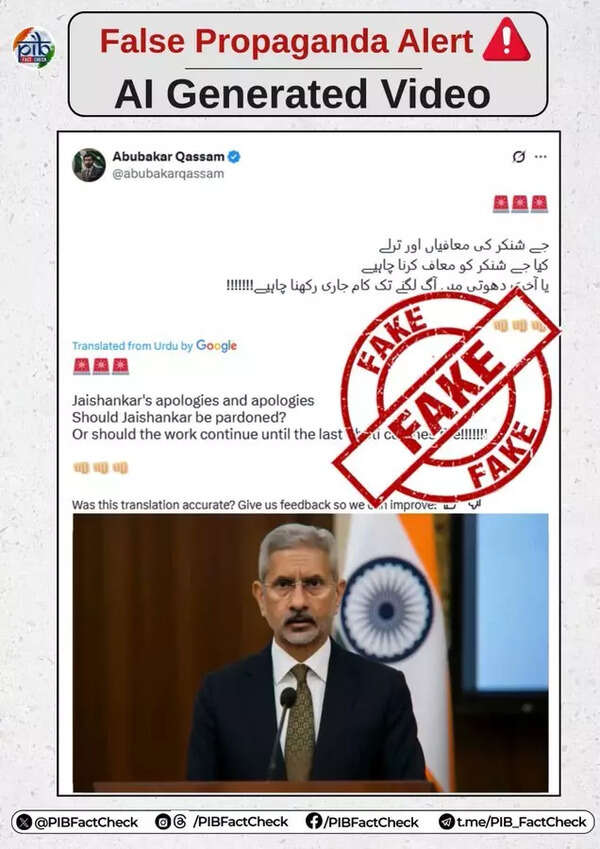
PIB shared the pic on X while fact-checking false claim on EAM S Jaishankar.
The weaponisation of AI, particularly in times of elections or war, is not just a nuisance or prank; it's a calculated effort to sway voters or influence public sentiment. Even to distort facts.
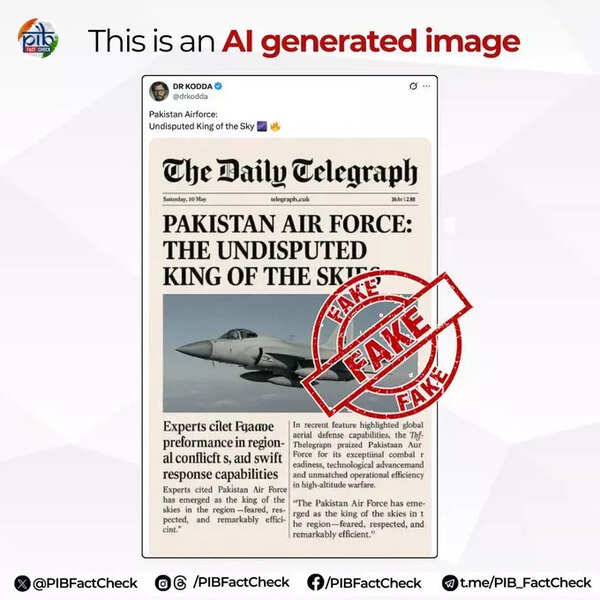
PIB shared the picture on X while fact-checking a false claim about The Daily Telegraph's story.
India, with tech-savvy population, is suffering the threat where mass-producing propaganda takes seconds, and it is no longer hypothetical but real, present, and dangerous.The threat isn't just reserved for wartime, it is increasingly creeping into India's democratic bloodstream.
Picture this:
A prominent politician appears on your WhatsApp feed, making inflammatory remarks about a sensitive religious issue. The video spreads like wildfire across social media, triggering outrage and potentially swaying thousands of voters. There's just one catch â the politician never actually said those words.
Welcome to the age of deepfakes, where seeing is no longer believing.
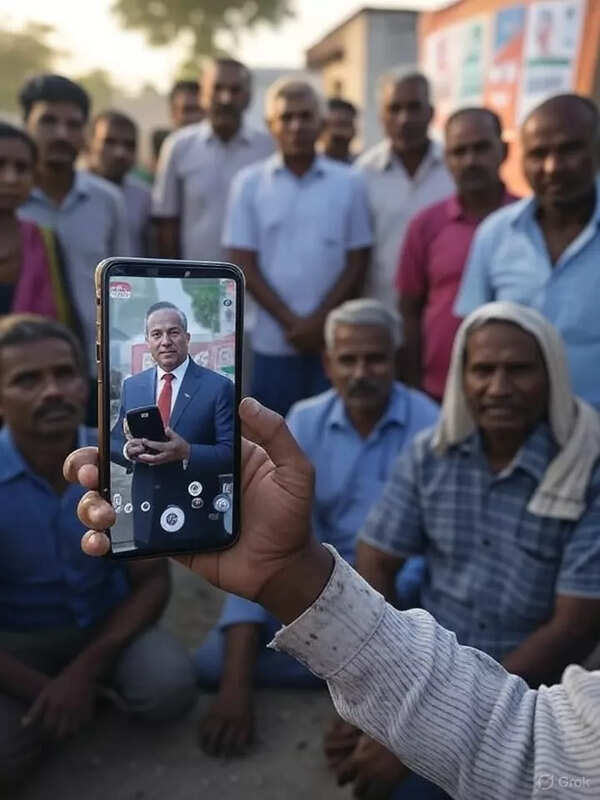
This is a representative AI image
While Artificial Intelligence offers powerful new tools for political campaigning and even diplomatic engagement, its rapid advancement also casts a long shadow â the rise of deepfakes and the potential for widespread digital deception. The very technology that amplifies a campaign's reach can also be weaponised to manipulate the truth, posing significant ethical challenges to the integrity of information and trust within India's democratic processes.
How serious is the threat of deepfakes in Indian elections?
In a conversation with TOI, Devesh Singh, a political communication strategist, said deepfakes are a serious threat, undermining electoral integrity through misinformation. In 2024:
- Fake videos of Aamir Khan and Ranveer Singh endorsing Congress sparked police complaints, reaching millions via WhatsApp's 535.8 million users.
- A deepfake of
Rahul Gandhi "resigning" spread false narratives, particularly in Hindi-speaking belts. - DMK's Karunanidhi deepfake, while strategic, blurred the lines between authentic and manipulated content.
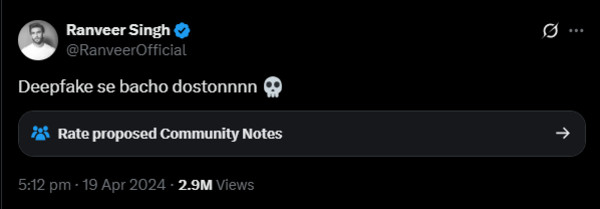
Ranveer Singh's message on deepfake
"Low digital literacy (76.32% adult literacy) exacerbates vulnerability, especially in rural areas. The Election Commissionâs May 2024 advisory, mandating deepfake labelling and removal within three hours, lacks robust enforcement, and India has no specific AI laws. With deepfakes created in 2-3 minutes, their viral potential threatens hyper-local constituencies, risking trust erosion and potential unrest if unchecked," he added.Talking about deepfakes and morphed videos, a digital communication consultant, Keshav Mishra, said, "these have been used to defame political opponents during elections. While digitally literate audiences can often identify AI-generated content, rural populations remain vulnerable to misinformation."
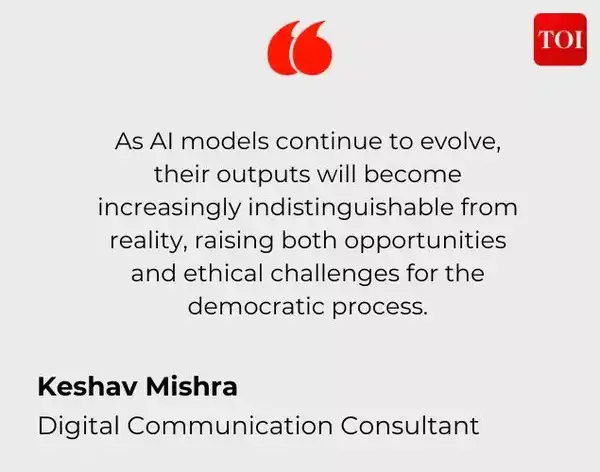
Expert's view on deepfakes
How quickly can harmful AI-generated content go viral?
While explaining harm caused by fake AI-generated content, Singh said harmful AI content spreads rapidly, often outpacing takedown efforts. "Misinformation spreads five times faster than corrections. A deepfake can reach tens of thousands in a day, underscoring the need for real-time monitoring and stricter platform accountability," he added.
AI and the new diplomacy: India goes global with code
As domestic politics is adapting to AI, India's foreign policy is also evolving under its influence. Recently, the world went mad over Ghibli Art, and even politicians went gaga over it.For example, in the wake of Ghibli art, AI united two nations â India and Israel, through AI-generated images. The Israeli Embassy in India shared an image showcasing the friendship between PM Modi and Benjamin Netanyahu in a beautiful Ghibli-style art piece. The Indian Embassy in Israel also shared images of PM Modi driving a vehicle on the shores with Netanyahu enjoying his company.
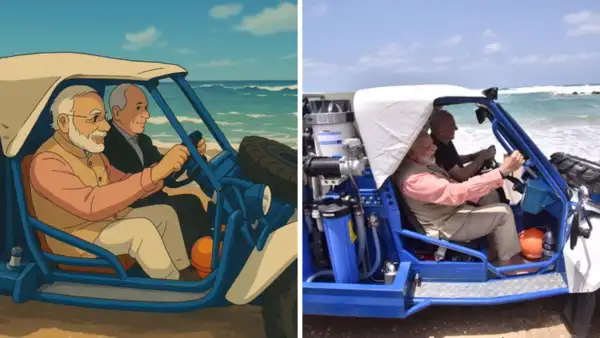
The Indian Embassy in Israel shared this picture on X.
The artistic portrayal is an example of how the two countries are strengthening ties at a crucial time (the Israel-Gaza conflict).
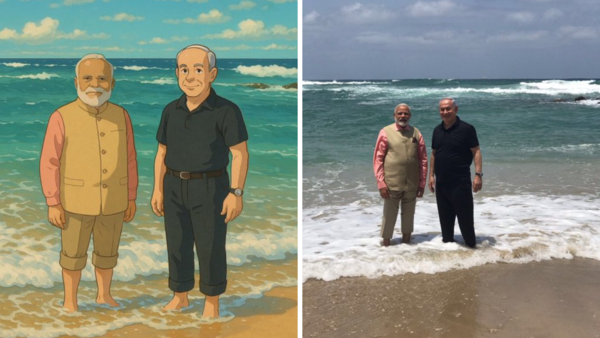
Israeli embassy in India shared this picture on X.
Apart from this, India is leveraging AI as a soft power tool on the global stage, from cyber diplomacy to multilateral tech partnerships.During AI Action Summit in Paris on February 11, 2025, PM Modi emphasised how "AI is already re-shaping polity, economy, security and even society.""AI is developing at an unprecedented scale and speed. And being adopted and deployed even faster. There is also a deep inter-dependence across borders. Therefore, there is a need for collective global efforts to establish governance and standards, that uphold our shared values, address risks, and build trust," he added.Highlighting India's tech-savvy youth at a global platform, he underlined the fact that India is building AI applications for public good. "India is building its own Large Language Model considering our diversity. We also have a unique public-private partnership model for pooling resources like compute power. It is made available to our start-ups and researchers at an affordable cost. And, India is ready to share its experience and expertise to ensure that the AI future is for Good, and for All," he added.
PM Modi's opening remarks at the Plenary Session of AI Action Summit, Paris
Cutting short, diplomacy is not just about defence, infrastructure, nuclear deals and trade tariffs anymore â it's also about tech stacks and AI models.
How is India using AI as a soft power or diplomatic tool globally?
Singh said India is leveraging AI to bolster its soft power, positioning itself as a tech governance leader:
- The Election Commission's 2024 AI content labelling advisories set a global benchmark for ethical AI in elections, noted by international media.
- PM Modi's safe AI advocacy in G20 and bilateral talks (e.g., with US leaders) enhances India's image as a responsible tech power.
- Bhashini's multilingual AI is being adapted for diaspora engagement, translating cultural content for Indian communities in the US and Gulf.
- AI startups like Krutrim and Polymath Solutions, plus plans for India-specific AI models, position India as an innovation hub for the Global South.
However, the lack of comprehensive AI legislation limits India's influence compared to the EU or the US. Still, its election AI experiments offer a model for democratic nations, strengthening its diplomatic narrative.Amid fears of AI working at the forefront and replacing jobs, a question arises: will it also replace politicians? Well, time will generate the code to decode the question. But now, we can say that AI might change how they win.With scale, diversity and digital ambition, India is positioned well to become a leader in ethical AI adoption. But, it is noteworthy that leadership won't come from tools alone.
